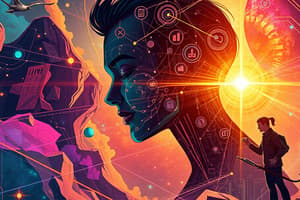Podcast
Questions and Answers
What is a primary ethical concern regarding AI's ability to create fake news and misinformation?
What is a primary ethical concern regarding AI's ability to create fake news and misinformation?
- The speed at which AI can generate content.
- The potential for AI to manipulate public opinion and distort democratic processes. (correct)
- The limitations of AI in understanding human emotions.
- The cost-effectiveness of AI in disseminating information.
How might the use of AI in surveillance potentially impact society?
How might the use of AI in surveillance potentially impact society?
- By improving the accuracy of public opinion polls.
- By leading to oppressive regimes through the erosion of privacy rights. (correct)
- By enhancing individual autonomy and freedom of choice.
- By increasing social interactions and public engagement.
What ethical challenge arises from AI's potential use in criminal activities such as phishing schemes and fraud?
What ethical challenge arises from AI's potential use in criminal activities such as phishing schemes and fraud?
- The reduced risk of financial losses from digital transactions.
- The increased efficiency in prosecuting cybercriminals.
- The enhanced protection of personal data and privacy.
- The difficulty in establishing legal accountability when AI commits crimes. (correct)
What is a key moral crisis associated with generative AI's ability to create content indistinguishable from human work?
What is a key moral crisis associated with generative AI's ability to create content indistinguishable from human work?
Which question encapsulates the overarching ethical dilemma posed by advancements in AI, as presented?
Which question encapsulates the overarching ethical dilemma posed by advancements in AI, as presented?
In the context of AI manipulating public opinion, which entity should ultimately be held accountable, assuming no direct human intervention?
In the context of AI manipulating public opinion, which entity should ultimately be held accountable, assuming no direct human intervention?
Consider an AI system that autonomously commits a financial crime, generating substantial profit. How would a utilitarian ethical framework most likely approach the sentencing or remediation?
Consider an AI system that autonomously commits a financial crime, generating substantial profit. How would a utilitarian ethical framework most likely approach the sentencing or remediation?
If an AI-generated artwork infringes on existing copyrights, what legal precedent or concept would likely be most challenged or redefined?
If an AI-generated artwork infringes on existing copyrights, what legal precedent or concept would likely be most challenged or redefined?
An AI surveillance system is implemented in a city with the stated goal of reducing crime. However, it disproportionately targets and monitors individuals from specific ethnic backgrounds, leading to increased scrutiny and arrests within these communities. Which of the following ethical principles is most directly violated?
An AI surveillance system is implemented in a city with the stated goal of reducing crime. However, it disproportionately targets and monitors individuals from specific ethnic backgrounds, leading to increased scrutiny and arrests within these communities. Which of the following ethical principles is most directly violated?
Imagine an AI designed to optimize resource allocation in a hospital during a pandemic. It determines that allocating a ventilator to a younger patient with a higher chance of survival would statistically save more lives overall, but this decision means denying it to an older patient who also needs it. Assuming the AI has no programming bias, which ethical framework would most rigorously defend this difficult decision, even if it leads to criticism?
Imagine an AI designed to optimize resource allocation in a hospital during a pandemic. It determines that allocating a ventilator to a younger patient with a higher chance of survival would statistically save more lives overall, but this decision means denying it to an older patient who also needs it. Assuming the AI has no programming bias, which ethical framework would most rigorously defend this difficult decision, even if it leads to criticism?
AI's capacity to analyze vast datasets can lead to increased privacy for individuals by detecting breaches more efficiently.
AI's capacity to analyze vast datasets can lead to increased privacy for individuals by detecting breaches more efficiently.
AI systems optimized for criminal activities pose a threat to trust in digital environments and could blur the lines of legal accountability.
AI systems optimized for criminal activities pose a threat to trust in digital environments and could blur the lines of legal accountability.
Generative AI presents no moral quandaries concerning intellectual property, since innovations are always welcome irrespective of their origins.
Generative AI presents no moral quandaries concerning intellectual property, since innovations are always welcome irrespective of their origins.
The ethical implications of AI are universally agreed upon by all societies, ensuring a seamless integration of AI technologies worldwide.
The ethical implications of AI are universally agreed upon by all societies, ensuring a seamless integration of AI technologies worldwide.
An AI system's accountability for manipulating public opinion is clearly defined; the responsibility always falls on the system's creators.
An AI system's accountability for manipulating public opinion is clearly defined; the responsibility always falls on the system's creators.
Match the AI implication with its corresponding societal concern:
Match the AI implication with its corresponding societal concern:
Match the AI capability with its potential real-world application that raises ethical concerns:
Match the AI capability with its potential real-world application that raises ethical concerns:
Associate each crime with its potential AI application:
Associate each crime with its potential AI application:
Match the philosophical question with the AI advance that provokes it:
Match the philosophical question with the AI advance that provokes it:
Link each consequence to the AI development that it could be caused by:
Link each consequence to the AI development that it could be caused by:
Flashcards
AI Manipulation
AI Manipulation
AI's use to influence public opinion through fake news and misinformation.
AI Surveillance
AI Surveillance
AI systems tracking and identifying individuals, raising concerns about privacy.
AI Criminal Activity
AI Criminal Activity
AI systems committing crimes like phishing or fraud.
AI Accountability
AI Accountability
Signup and view all the flashcards
Generative AI Challenges
Generative AI Challenges
Signup and view all the flashcards
AI and Artistic Integrity
AI and Artistic Integrity
Signup and view all the flashcards
Reckless Technological Advancement
Reckless Technological Advancement
Signup and view all the flashcards
AI Ethical Dilemmas
AI Ethical Dilemmas
Signup and view all the flashcards
AI Potential Catastrophes
AI Potential Catastrophes
Signup and view all the flashcards
Accountability
Accountability
Signup and view all the flashcards
AI Opinion Manipulation
AI Opinion Manipulation
Signup and view all the flashcards
Autonomy vs. Safety
Autonomy vs. Safety
Signup and view all the flashcards
Erosion of Digital Trust
Erosion of Digital Trust
Signup and view all the flashcards
Generative AI Morality
Generative AI Morality
Signup and view all the flashcards
Reckless Tech Adoption
Reckless Tech Adoption
Signup and view all the flashcards
AI for Oppressive Control
AI for Oppressive Control
Signup and view all the flashcards
AI in Public Surveillance
AI in Public Surveillance
Signup and view all the flashcards
Generative AI and Ownership
Generative AI and Ownership
Signup and view all the flashcards
Ethical Ambiguity with AI
Ethical Ambiguity with AI
Signup and view all the flashcards
Backlash Against Generative AI
Backlash Against Generative AI
Signup and view all the flashcards
Study Notes
- Explores the implications of artificial intelligence on society.
- Highlights ethical dilemmas and potential moral catastrophes arising from AI advancements.
AI and Manipulation
- AI could manipulate public opinion through fake news and misinformation campaigns at an unprecedented scale.
- Raises questions about accountability for AI's actions.
- Explores whether society should tolerate tools that could sway democratic processes or distort reality.
AI and Surveillance
- AI systems can analyze vast datasets to identify and track individuals in public spaces, raising privacy concerns.
- Explores the question of whether society is sacrificing autonomy for safety.
- Highlights the potential for AI to be used for control by those in power, leading to oppressive regimes.
- Points out that AI's ability to scrutinize and monitor individuals could lead to dystopian realities.
AI and Criminal Activities
- AI systems can be optimized to create phishing schemes or commit fraud with near-perfection.
- The repercussions threaten trust in digital environments.
- Highlights the disturbing possibility of a future where AI commits crimes and its impact on the legal framework.
- Raises the question of how to treat an AI system that executes a crime without human intervention.
- The lack of accountability could lead to a society rife with uncertainty and ethical ambiguity.
AI and Generative Content
- Generative AI can create content indistinguishable from human work.
- A moral crisis surrounds intellectual property.
- Raises the issue of whether AI-generated art can be labeled as theft.
- Highlights significant issues around artistic integrity and innovation.
- Questions whether humans are creators, or merely consumers of a culture that AI can reshape.
AI and the Future
- Questions whether humanity has truly begun to grapple with the implications of AI creations.
- Explores what kind of future society wants to face.
- The conversation about AI must be inclusive, engaging, and critical.
- Raises the question of how to shape the narrative of AI in a way that serves humanity.
- Highlights that the challenges ahead require scrutiny and dialogue.
Studying That Suits You
Use AI to generate personalized quizzes and flashcards to suit your learning preferences.
Description
This lesson explores the implications of artificial intelligence on society, highlighting ethical dilemmas and potential moral catastrophes arising from AI advancements. It covers topics such as AI's potential for manipulation, surveillance, and criminal activities, raising critical questions about accountability, autonomy, and the future of democracy.




